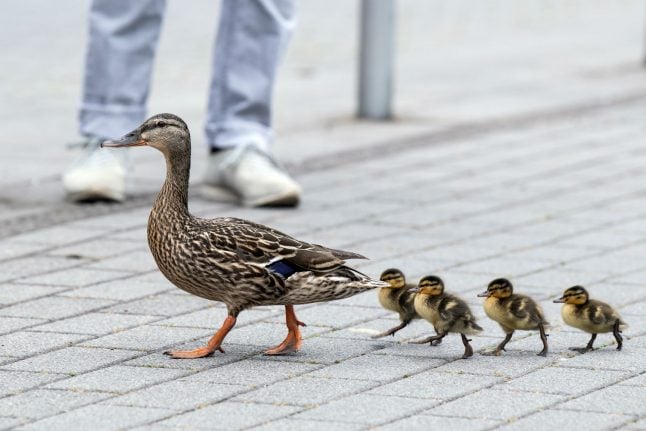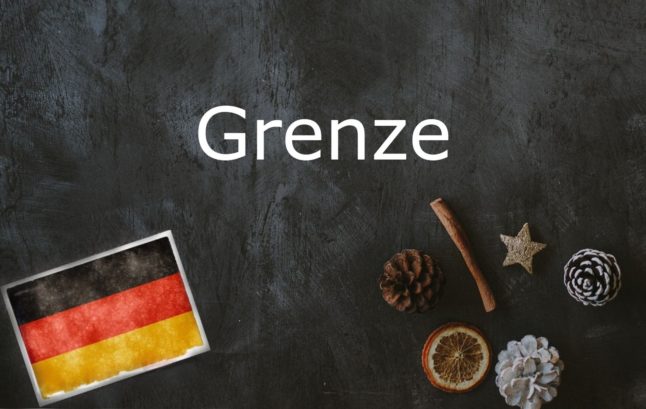One surefire way to tell whether somebody is an east or west German is to ask them what noise a duck makes. West Germans will typically say quak, quak, while east Germans will say nak nak nak.
As far as the latter are concerned, it’s frogs that go quak, not ducks. The sound nak nak actually comes from a well-known children’s TV character in GDR, Schnatterinchen the duck. These two variants are still being passed down by parents to their children today.
A new book published by Duden about language in the GDR – fitting given the upcoming 30th anniversary of German reunification on October 3rd – is more concerned with other aspects of everyday speech.
In her book Mit der Schwalbe zur Datsche – so sprach der Osten (roughly translated as ‘From the moped to the summer cottage – this is how East Germans spoke’), author Antje Baumann explains 50 terms used in the German Democratic Republic.
The list ranges from Antifaschistischer Schutzwall (anti-facist protective wall), the East German term to refer to the Berlin Wall, to the widely spread phenomenon of the Westpaket (a care package sent by West Germans to the East).
Unique meanings
The word Datsche seen in the book’s title is one of the many GDR words that came from the Russian language (datscha is the Russian term for a small summerhouse).
The word Schwalbe refers not just to any moped, rather to a very popular two-wheeled model manufactured in the Simson factory in Suhl.
READ ALSO: Here's a little known East German vehicle that's actually amazing
The word Kindertag (children’s day) also sets east Germans apart from their western counterparts: “if you think that children’s day takes place in September, you didn’t live in the GDR,” the author says. “Unlike in the West, children’s day was always a big deal in the East: every child knew that June 1st would be a day off school spent singing songs, exchanging gifts and going to parties.”

Animal noises aren't the only language points that East and West Germans disagree on. Photo: DPA
Language of the state
Baumann also explains who Bausoldaten (construction soldiers) were: between 1964 and 1989, around 15,000 young men refused to take up military service, an offence which was punishable by prison. Instead, they were forced to build military facilities and kept separate from the other soldiers.
The SED (Socialist Unity Party of Germany) saw these men as “hostile enemy forces” and made it deliberately difficult for them to find a job or gain a university place. They could be recognised by the spades pinned on their epaulettes.
An Eingabe (which translates literally as petition) was a means of complaint in the GDR: the 1961 constitution granted everyone the right to offer information, complaints or suggestions to the authorities.
The GDR’s polytechnische Unterricht (polytechnical teaching) policy was based on the Soviet-influenced “Law on the Socialist Development of Schools” which came into force in 1959 and regulated children’s educational careers from kindergarten to starting work.
The polytechnic high school (POS) with ten-year groups became the default school for all children in the GDR. The aim was to ensure every child developed a “well rounded, educated and socialist personality”.
Popular culture
Freikörperkultur (nudism) was a welcome breath of fresh air for GDR citizens: “Not everybody went swimming naked, as the stereotype often suggests. But despite the initial resistance of the GDR government, nude bathing soon became very popular. In other places such as the Soviet Union, however, you could be arrested for it.”
Nudism as a practice is, of course, older than the GDR, originating from the Lebensreform (life reform) movement in the 19th century.
Other staples of GDR vocabulary include Intershop and Kaufhalle, with the first being a shop that sold western goods in exchange for foreign currencies, and the second being the East German word for the supermarket.
READ ALSO: 10 surprising uses of English in former East Germany
“However, it was only a supermarket in the sense that the building looked the same: the range of goods on offer differed significantly from the west, they were almost devoid of advertising and prices remained stable.”
Jugendweihe (youth consecration) and Poliklinik (polyclinic) were also key terms in the GDR. The former is a secular coming of age ceremony held as an alternative to church confirmations, while the latter refers to a medical practice home to both GPs and specialist doctors who worked in the same building in order to share the rather expensive medical equipment.
East Germans have long since learned to say Plastik (plastic) instead of Plast or Plaste. The sociolinguistic explanation for this is that the minority or underprivileged group (in this case those from the East) will always end up having to learn both their language variant and the variant of the dominant group. In the GDR, many things were made out of plastic – even some cars.
And finally, the Westpaket: up to 25 million care packages were sent to East Germany each year. These packages, usually filled with goods such as coffee, chocolate, pantyhose and cosmetics, were of great economic significance to the GDR government and therefore monitored very closely.
“Books and newspapers, as well as sound and image equipment, were strictly forbidden.” The thorough controls at the border meant that packages could take up to six weeks to arrive.



 Please whitelist us to continue reading.
Please whitelist us to continue reading.
Member comments